

When future taxpayers look back to the moment they started taking back control of their schools, roads and services, they will look to 2013. From coast to coast, taxpayers rejected reckless outsourcing schemes. They held for-profit corporations accountable. And they said “no deal!” to CEOs who would put profits ahead of public health and safety.
These victories don’t always appear in the national media. But taken together they represent a real shift. Working together, I’m sure we will have many more in 2014.
Connecticut: Opponents of education privatization defeated three Bridgeport school board members who supported pro-charter schools superintendent Paul Vallas.
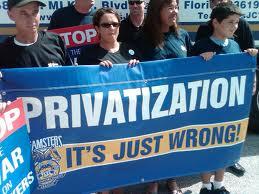 Idaho: Corrections Corporation of America left the state “after more than a decade marked by scandal and lawsuits surrounding its operation of the state’s largest prison.” Upon hearing the news,
Idaho: Corrections Corporation of America left the state “after more than a decade marked by scandal and lawsuits surrounding its operation of the state’s largest prison.” Upon hearing the news,
» Read more about: Outsourcing Wars: What the New Year Can Learn from 2013 »
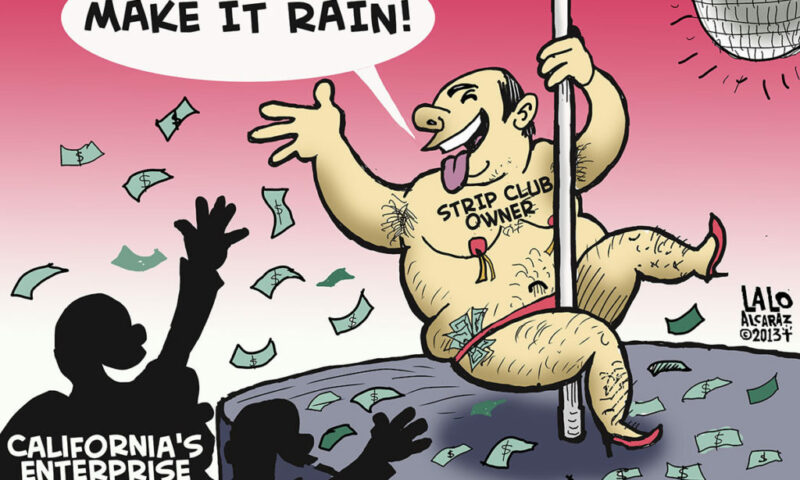
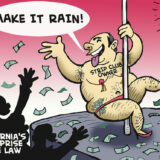
Illustration by Lalo Alcaraz. (Click image twice for full size.)
See Gary Cohn’s reports on California’s enterprise zone program and the tax credits received by two Sacramento strip clubs.
» Read more about: Lalo Alcaraz on State’s Enterprise Zone Program »


You have to hand it to conservatives — when they don’t like what they see in the mirror, they investigate the mirror-maker. Likewise, if they get knocked to the ground — as, say, the way they did in the 2012 elections — they just get up and say the exact same things that got them decked in the first place. Looking at the following quotes from the past year can give a reader the impression that, for some people, 2012 never happened — or 2008, for that matter.
People with conventional views must repress a gag reflex when considering the mayor-elect of New York — a white man married to a black woman and with two biracial children.
— Richard Cohen, Washington Post columnist
Wanting a white Republican president doesn’t make you racist, it just makes you American.


Before Capital & Main emerged from our earlier blog, Frying Pan News, writers Vivivan Rothstein and Steven Mikulan took in a movie now and then. Here are excerpts from some of their 2013 reviews.
 12 Years a Slave Towering profiles of moss-hung oaks, silhouetted against languid Southern sunsets, form some of the indelible images from Steve McQueen’s new film. So too do gruesome close-ups of the scarred backs of antebellum slaves, whose skin has hardened to bark by years of whippings. This is the central visual paradox in 12 Years a Slave, which contrasts quiet moments of primeval, pastoral beauty with the loud, primitive violence practiced by plantation owners. (Steven Mikulan)
12 Years a Slave Towering profiles of moss-hung oaks, silhouetted against languid Southern sunsets, form some of the indelible images from Steve McQueen’s new film. So too do gruesome close-ups of the scarred backs of antebellum slaves, whose skin has hardened to bark by years of whippings. This is the central visual paradox in 12 Years a Slave, which contrasts quiet moments of primeval, pastoral beauty with the loud, primitive violence practiced by plantation owners. (Steven Mikulan)
Go Public I wanted to cry after watching Go Public: A Day in the Life of an American School District.
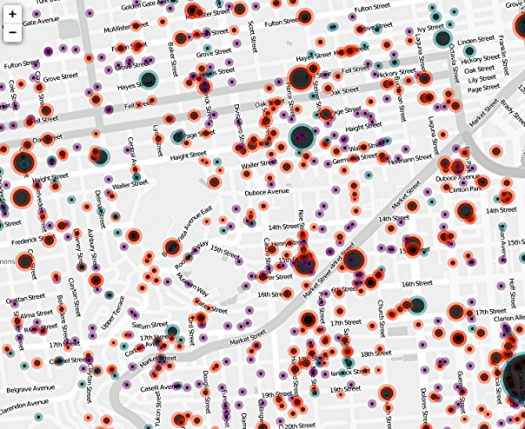
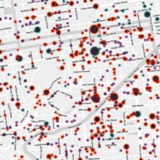
The Anti-Eviction Mapping Project (AMP) was formed to show how speculators target Bay Area communities — and, in our small way, to assist in affecting change. The volunteer AMP collective grew from tangential connections of concerned strangers in April, 2013. Four core members—Erin, Julia, Olivia and myself—have expanded to 12 and counting. We share a deep concern for the growing displacement of our friends and neighbors, yet as individuals, we were initially unsure how we could participate in stopping it.
AMP’s members have varying strengths in data analysis, research, web design, programming and direct action which all complement each other. We hope that our maps and digital storytelling can de-isolate the victims of no-fault eviction and also serve as tools for collective resistance.
San Francisco, like most large cities, is predominantly composed of renters—65 percent. Renters feed the city apparatus as voters, small business owners,


‘Tis the season of miracles.
That’s not a phrase that sits easily with the modern mind. Nevertheless, the stories with which we mark this time of year all contain gestures, unexpected motions and things hoped for — but that are not at all certain or even vaguely possible. The lamp held enough oil for a couple of days at most, but it stays lit for eight – until more can be brought from a distance. A peasant sees the Virgin Mary but, of course, the local bishop doesn’t believe that such a simple person would be visited by Her, but another vision accompanied by long-stemmed red roses convinces him. A poor working family bears a child in circumstances no middle class American can quite grasp, and people think this one will be the liberator of his people. Those are miracles.
Of course,


It’s 10 p.m. when the taxi glides
into the rain-slicked parking lot.
A woman in slippers gets out
bundling a baby in her arms.
Next, comes a small boy dragging a shopping bag
filled with a jumble of clothes.
“Your room is Number 9,” I say pointing,
and the woman hurries towards it.
As we follow, I lift the bag from the boy,
his face and neck dark with bruises.
When we reach the door, he stops, asks,
“Will he find us here?”
I want to say, No, honey,
that bastard will never find you here.
Instead, I whisper, “Who?”
His voice, a twist of worry and hope, he says,
“Santa.”
Cece Peri’s poems have appeared in Gift of Words: Poems for the Iraqi People;


 Last week the voter-approved $15 minimum wage set for airport-related workers near the town of SeaTac, Washington, survived a recount and is now supposed to go into effect on January 1. The win sets a new standard for pay and benefits for hospitality and transportation workers, and will bring much-needed financial relief for low-wage workers who cater to millions of travelers at one of the country’s busiest international airports. SeaTac’s Proposition 1, which voters initially approved last month, will bring much-needed improvements to the lives of more than 6,300 workers who currently bring home less than $1,500 per month on average. Backers of the historic measure say the new minimum wage for SeaTac workers will stimulate the local economy to the tune of $54 million per year.
Last week the voter-approved $15 minimum wage set for airport-related workers near the town of SeaTac, Washington, survived a recount and is now supposed to go into effect on January 1. The win sets a new standard for pay and benefits for hospitality and transportation workers, and will bring much-needed financial relief for low-wage workers who cater to millions of travelers at one of the country’s busiest international airports. SeaTac’s Proposition 1, which voters initially approved last month, will bring much-needed improvements to the lives of more than 6,300 workers who currently bring home less than $1,500 per month on average. Backers of the historic measure say the new minimum wage for SeaTac workers will stimulate the local economy to the tune of $54 million per year.
Predictably, the corporate interests who’ve so far ended up on the losing side have no intention of simply bowing down to the will of the city’s voters.
» Read more about: SeaTac Workers Await Ruling on New $15 Minimum Wage Law »
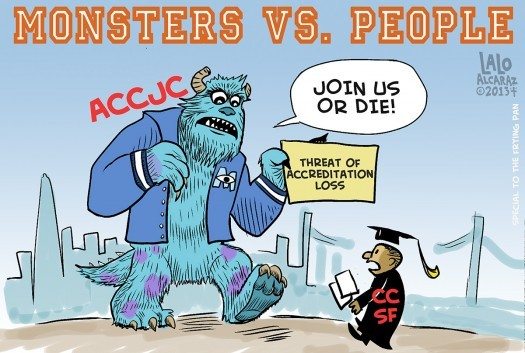
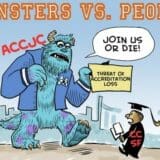
To appreciate the value of a community college education, consider the transformation of Shanell Williams.
By the time she was a teenager, Williams was constantly getting into trouble on the streets of San Francisco’s Fillmore District. Her abuse of drugs and alcohol, along with a difficult family life, would lead her into the juvenile justice system, drug treatment centers and foster homes.
“I was a juvenile delinquent,” she admits.
Today Williams, now 29, hardly resembles that troubled youth. She is a hard-working student at City College of San Francisco, taking urban studies courses and hoping to transfer to Stanford University or the University of California at Berkeley. She has served as president of the student council at CCSF’s Ocean campus and was elected to be the student representative on CCSF’s Board of Trustees.
“Community college has helped give me a pathway to higher education,” she says.
That pathway may soon be closing.


 A few years ago, the Los Angeles Times began a practice of selling ads on the front pages of its sections. It was a slow build, with a preliminary announcement in 2007 and, two years later, it actually began to happen. Reaction from readers was not positive. The continued practice is still not exactly popular. At times, it’s clear these things are ads, while in other circumstances, they are designed to look like news articles.
A few years ago, the Los Angeles Times began a practice of selling ads on the front pages of its sections. It was a slow build, with a preliminary announcement in 2007 and, two years later, it actually began to happen. Reaction from readers was not positive. The continued practice is still not exactly popular. At times, it’s clear these things are ads, while in other circumstances, they are designed to look like news articles.
Whether this piece falls into that new tradition, I’m not sure. The “article” was written by Paresh Dave, and tells us about Riddell’s new InSite Impact Response System, a football helmet Riddell says will protect players against concussions. (The system uses sensors inside the helmet, which wirelessly relay to the sidelines data about potentially traumatic hits.) High schools are purchasing the helmets and offering them to parents for free or at a limited cost and,